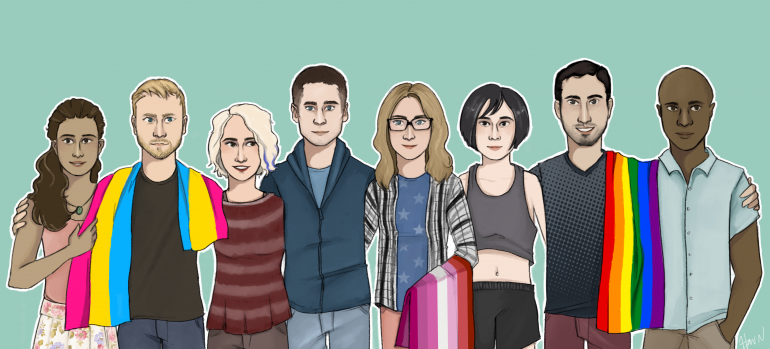Graphic by Hannah Boston
Art has always had the power to transform lives, push boundaries, and revitalize reality. However, sometimes, it does more than that: it puts words to seemingly undefinable emotions, forges unbreakable bonds to other humans, and revolutionizes our perceptions of the world. Netflix’s Sense8 has achieved these higher goals, and its cancellation (announced on June 1, the first day of Pride Month last year) reminds us that some are just not ready to have their reality reconstructed. Its two-hour farewell episode (fought for by the fans), premiering June 8, 2018, is our last chance to say thank you to this world-altering show.
The world may not have been truly ready for the revolution that is Sense8, but it sure needed it. When it premiered in June of 2015, Sense8 introduced eight psychologically-connected individuals from around the globe who learn the nuances of human connection through their cerebral network. Nomi (Jamie Clayton), Lito (Miguel Ángel Silvestre), Sun (Bae Doona), Capheus (Toby Onwumere), Will (Brian J. Smith), Kala (Tina Desai), Wolfgang (Max Riemelt), and Riley (Tuppence Middleton), AKA the cluster, demonstrate that sex, passion, anger, grief, and pain are not singular journeys, but explorations that humans take on together. With its stylized depictions of sex, drugs, violence, and most importantly, love, Sense8 normalizes human nature in its purest forms.
Sense8, since its inception, has been hailed as a landmark show for queer representation. With two characters within the cluster canonically queer (Nomi is gay and trans and Lito is gay) and all of the cluster members labeled pansexual by the show’s creators, Lana and Lilly Wachowski, the show has normalized queer people’s lives in the mainstream while simultaneously intimately acquainting the audience with the community in a realistic, sincere fashion.
Nomi, a hacker-extraordinaire, is introduced having sex with her girlfriend, Amanita, with a rainbow-colored dildo. Their relationship, sexy and loving, full of devotion and unquestionable love, has been hailed for its depiction of interracial lesbian love between a trans woman and a cis woman without any of the usual stereotypes or offensive undertones. With scenes at San Francisco Pride and monologues about finding strength in community (“Today, I march to remember that I’m not just a me. I’m also a we. And we march with pride” – Season 1, Episode 2), Nomi’s character is allowed a humanizing narrative that very few other trans people are allowed on television. Written by two trans women (Lana and Lilly Wachowski) and portrayed by a trans woman (Jamie Clayton), Sense8’s authenticity is its key to credible and poignant representation.
Also central to the narrative is Lito, a gay actor hailing from Mexico City. In love with his long-time boyfriend, Hernando, he remains closeted for fear of ruining his acting career. Overdramatic and emotional, his navigation of learning to love publicly regardless of the cost is constantly inspiring and hilarious. Lito and Hernando’s love melds infallible devotion and realistic obstacles; it shows how love can set anyone free from the burdens of society’s expectations.
But what is truly revolutionary is the narrative’s lack of adherence to sexual and societal norms, portraying psychic orgies between the cluster and sex scenes written and directed without the intended objectification of the mainstream male gaze. Sexuality is depicted as fluid and uninhibited, without shame or embarrassment. Male characters are often shown as trapped within toxic masculinity and are afraid to explore themselves as sexual beings, but Sense8 removes societal baggage through unapologetic and emotional sex scenes and allows them to ponder themselves without fear.
It isn’t a tall order to ask for queer characters to be a part of a genuine narrative and have their storylines elevated to the stature of non-queer characters, but it still seems to be. Sense8 doesn’t just provide commensurate storylines; it represents the narratives that are often glossed over by mainstream shows. From trans bodily autonomy to the importance of pride festivals, there are no bland and generic storylines that scream “queer life through the eyes of straight people.” This is a queer show, written by queer people and catered to queer people. Our lives are not side-stories; they are the main events.
The loss of Sense8 feels like losing a best friend, and it’s unfortunate that such storylines will not be continued. But it is a testament to the changing world that a show like this could have existed in the first place. As the finale is dedicated to its audience members, it is with great hope that it provides closure to these treasured characters. We must depart from this masterpiece with its core messages in tow: live authentically and fabulously, waste no moment of precious life, and love above all else. Thank you, Sense8; we will forever be indebted to you.
“Look, love is not something we wind up, something we set or control. Love is just like art. A force that comes into our lives without any rules, expectations or limitations. Love, like art, must always be free” – Season 1, Episode 9.
Catch the series finale of Sense8 on Netflix, streaming everywhere June 8.

